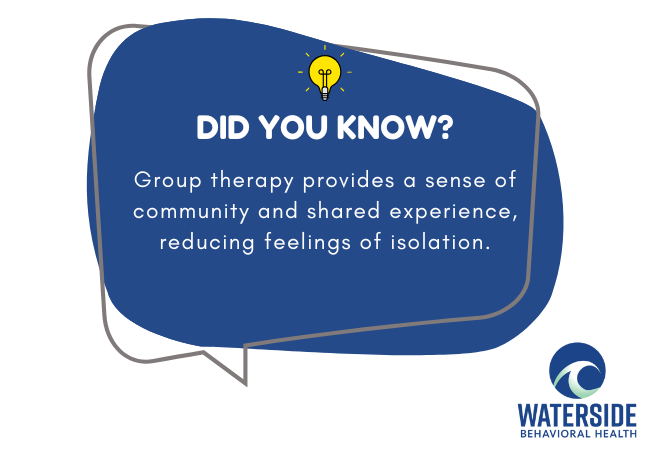Living with depression can often feel like a solitary journey. The weight of persistent sadness, lack of motivation, and overwhelming fatigue can isolate individuals from friends, family, and even themselves. While individual therapy and medication are well-known treatments for depression, group therapy has emerged as a powerful complement—or even a central pillar—in many recovery journeys. It offers a shared space where participants can connect, heal, and grow alongside others facing similar challenges. But how does group therapy actually help with depression? And what unique advantages does it bring?
This article explores the benefits of group therapy for those navigating depression, highlighting how connection, structure, and mutual support can pave the way toward long-term emotional wellness.
The Power of Shared Experience
One of the most immediate and lasting benefits of group therapy is the realization that you are not alone. For individuals grappling with depression, it’s common to feel like no one else understands their pain. Even in the presence of loved ones, there may be a sense of isolation that feels impossible to bridge.
Group therapy breaks down this isolation. Sitting in a room—or even a virtual space—with others who are facing the same emotional hurdles can be a revelation. Participants hear stories that mirror their own experiences, fears, and triumphs. This shared understanding builds empathy and a sense of solidarity, which in itself is deeply healing.
Even more importantly, participants often find their own voice through listening. Someone else might articulate a feeling they haven’t been able to describe, prompting moments of insight and reflection. Over time, these moments accumulate and foster a renewed sense of connection to the world around them.
A Safe Space for Emotional Expression
In a supportive group therapy setting, individuals are encouraged to share without fear of judgment. Many people with depression struggle with internalized stigma. They may feel guilty for their emotions, believe they should “just get over it,” or assume others won’t understand. These beliefs can silence them in everyday life.
Group therapy creates a structured environment where vulnerability is welcomed, not dismissed. With guidance from a trained facilitator, participants practice opening up in ways that promote both personal growth and group cohesion. As others listen with empathy, shame and guilt begin to lose their grip.
This kind of expression is cathartic. When someone finally says out loud what they’ve kept hidden for years—and is met with understanding instead of scorn—it becomes easier to start challenging the negative thought patterns that fuel depression.
Building Communication and Coping Skills
Another key benefit of group therapy is skill-building. While the emotional support of peers is invaluable, most group therapy sessions also include practical components aimed at strengthening communication, emotional regulation, and problem-solving skills.
Therapists who lead these groups often incorporate evidence-based techniques such as role-playing, assertiveness training, and mindfulness exercises. These tools are introduced in the context of real-life struggles, which helps participants understand how to apply them outside the group.
Over time, members learn not just how to express their emotions, but how to advocate for themselves, set healthy boundaries, and navigate life’s challenges with greater resilience. This is particularly helpful for people who have felt overwhelmed or powerless in the face of their depression.
A Sense of Accountability and Structure
When depression takes hold, routines can unravel. Getting out of bed, eating meals, going to work or school—all of these can become uphill battles. Group therapy offers structure. It becomes a consistent point in the week where individuals know they will be seen, heard, and encouraged.
This consistency builds momentum. Just showing up becomes a victory, and with each session, the habit of caring for oneself grows stronger. Additionally, group members often hold each other accountable—not in a punitive way, but through encouragement and support. A gentle “how did your week go?” can become a powerful motivator to take small steps forward.
Learning Through Observation
Group therapy also provides the unique opportunity to learn by watching. As members share their experiences, both struggles and successes, others can gain insight into their own situations.
Perhaps someone speaks about how setting a small goal each day helped them begin to reengage with life. Or another member discusses their journey of rebuilding trust in relationships. These shared narratives serve as living proof that healing is possible.
This modeling effect can be particularly inspiring. Hearing from someone who was once in a similar place but has made progress allows participants to envision a path for themselves. It nurtures hope, one of the most essential—and often elusive—elements in depression recovery.

Tailoring Group Therapy to Individual Needs
It’s important to note that group therapy isn’t a one-size-fits-all experience. There are various formats and specialties, from open-ended support groups to structured cognitive-behavioral sessions.
For those who benefit from clear goals and strategies, a group that incorporates Cognitive-Behavioral Therapy in Massachusetts may be ideal. These groups focus on identifying distorted thinking patterns and learning how to replace them with healthier alternatives. On the other hand, a more process-oriented group might be better suited for individuals who need space to explore emotions and build interpersonal connections.
Matching the right group to the individual’s needs and personality is critical for success. At Waterside Behavioral Health, clinical professionals assess each person’s history, symptoms, and goals to recommend the most fitting group therapy option.
When Group Therapy Works Best
Group therapy can be effective as a standalone treatment for mild to moderate depression, particularly when individuals are motivated to engage and share. However, it is often most successful when used as part of a comprehensive treatment plan. Many individuals find it beneficial to pair group sessions with one-on-one therapy or medication management.
Some choose to begin their journey in more structured settings, such as Intensive Outpatient Programs in Massachusetts, where group therapy is integrated into a daily schedule alongside individual counseling and psychiatric care. These programs provide a higher level of support for individuals who need more intensive care but do not require hospitalization.
Others may enter group therapy after completing a stay in Partial Hospitalization Programs in Massachusetts, using it as a bridge between acute treatment and everyday life. This step-down approach helps ensure continuity of care and a gradual return to independence.
Why Choose Waterside Behavioral Health?
Choosing the right mental health provider is one of the most important steps in the recovery journey. At Waterside Behavioral Health, we understand that depression is not just a condition—it’s a deeply personal struggle that affects every facet of life. That’s why our approach to treatment is rooted in compassion, expertise, and a commitment to individualized care.
What sets us apart is our dedication to fostering authentic healing communities through our group therapy programs. We don’t just place people in groups—we carefully evaluate each client’s history, goals, and emotional readiness to match them with the right therapeutic environment. This attention to fit ensures that every participant feels supported, understood, and encouraged from day one.
Our clinicians are not only licensed mental health professionals—they are also deeply invested in your long-term wellness. They are trained in evidence-based modalities like cognitive-behavioral therapy, mindfulness-based approaches, and trauma-informed care, and bring years of experience facilitating dynamic, impactful group sessions. Every group we offer is led by a therapist who knows how to strike the balance between structure and emotional freedom, allowing participants to explore their feelings while building essential life skills.
Waterside Behavioral Health also provides flexible care options to meet a variety of needs. Whether you are transitioning out of inpatient care or looking for ongoing support, our group therapy sessions can be integrated into a broader treatment plan. For some, that might mean attending therapy while enrolled in a structured outpatient program. For others, group sessions may complement individual counseling and psychiatric services.
We are proud to operate as a trusted Mental Health Treatment Center in Massachusetts, where clients find not just treatment, but hope. Our facility is warm, inviting, and designed to promote a sense of calm and connection. We know that the environment you heal in matters—and we’ve built ours to support you fully, every step of the way. When you choose Waterside Behavioral Health, you’re not just starting therapy—you’re joining a community of care. Our mission is to walk beside you as you move toward healing, empowerment, and a renewed sense of possibility.
Conclusion
Depression can make the world feel small, dark, and disconnected—but healing often begins when we reconnect with others. Group therapy offers a unique space where individuals can share their truths, learn from one another, and grow in ways that individual treatment alone may not always provide. Through mutual support, shared wisdom, and guided exploration, group therapy becomes more than just a treatment modality—it becomes a community of healing.
If you or a loved one is struggling with depression, know that you don’t have to go through it alone. Waterside Behavioral Health is here to help. Call us today at (774) 619-7750 to learn how group therapy can support your path to wellness.
Frequently Asked Questions (FAQs)
What is group therapy for depression?
Group therapy for depression involves a small, guided group of individuals working with a licensed therapist to discuss their experiences, share coping strategies, and support one another’s healing journey.
How does group therapy help in depression recovery?
It reduces isolation, improves interpersonal skills, and provides emotional validation from others with similar struggles. This collective process enhances self-awareness and resilience.
Who leads group therapy sessions?
Sessions are typically facilitated by licensed mental health professionals trained in group dynamics and evidence-based approaches like CBT, DBT, or trauma-informed therapy.
Is group therapy as effective as individual therapy?
While effectiveness varies by individual, many find that group therapy offers unique benefits, such as peer connection and shared learning, that complement individual counseling.
Can I participate in group therapy if I’m shy or introverted?
Absolutely. Many participants start quietly and gradually become more comfortable. Therapists are trained to create safe, inclusive spaces that support all personalities.




